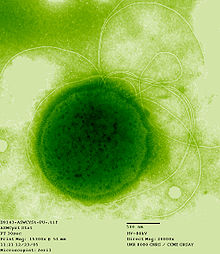Thermococcus gammatolerans
| Thermococcus gammatolerans | |
|---|---|
 |
|
| Thermococcus gammatolerans | |
| Scientific classification | |
| Domain: | Archaea |
| Phylum: | Euryarchaeota |
| Class: | Thermococci |
| Order: | Thermococcales |
| Family: | Thermococcaceae |
| Genus: | Thermococcus |
| Species: | T. gammatolerans |
| Binomial name | |
|
Thermococcus gammatolerans Jolivet , 2003 |
|
Thermococcus gammatolerans is an archaea extremophile and the most radiation-resistant organism known to exist.
Discovered in 2003 in a submarine hydrothermal vent in the Guaymas Basin about 2,000 meters deep off the coast of California, Thermococcus gammatolerans thrives in temperatures between 55–95 °C with an optimum development at approximately 88 °C. The optimal growth pH is 6, favoring the presence of sulfur (S), which is reduced to hydrogen sulfide (H
2S). It is the organism with the strongest known resistance to radiation, supporting a radiation of gamma rays from 30,000 gray (Gy).
Along with the genera Palaeococcus and Pyrococcus, Thermococcus belongs to the Thermococcaceae family, sole family of the Thermococci (called "Protoarchaea" by Cavalier-Smith), a class in the phylum Euryarchaeota of Archaea.Thermococcus species live in extremely hot environments such as hydrothermal vents with a growth optimum temperature above 80 °C. Thermococcus and Pyrococcus (literally "ball of fire") are both chemoorganotrophic anaerobic required. Thermococcus spp. prefer 70–95 °C, whereas Pyrococcus prefer 70–100 °C.
The resistance to ionizing radiation of T. gammatolerans is enormous. While a dose of 5 Gy is sufficient to kill a human, and a dose of 60 Gy is able to kill all cells in a colony of E. coli, Thermococcus gammatolerans can withstand doses of up to 30,000 Gy, and an instantaneous dose of up to 5,000 Gy with no loss of viability.
Thermococcus gammatolerans was discovered in 2003 in samples collected from a hydrothermal chimney at the Guaymas Basin about 2,000 meters deep off the coast of California, (27° 1' N, 111° 24' W).
...
Wikipedia
